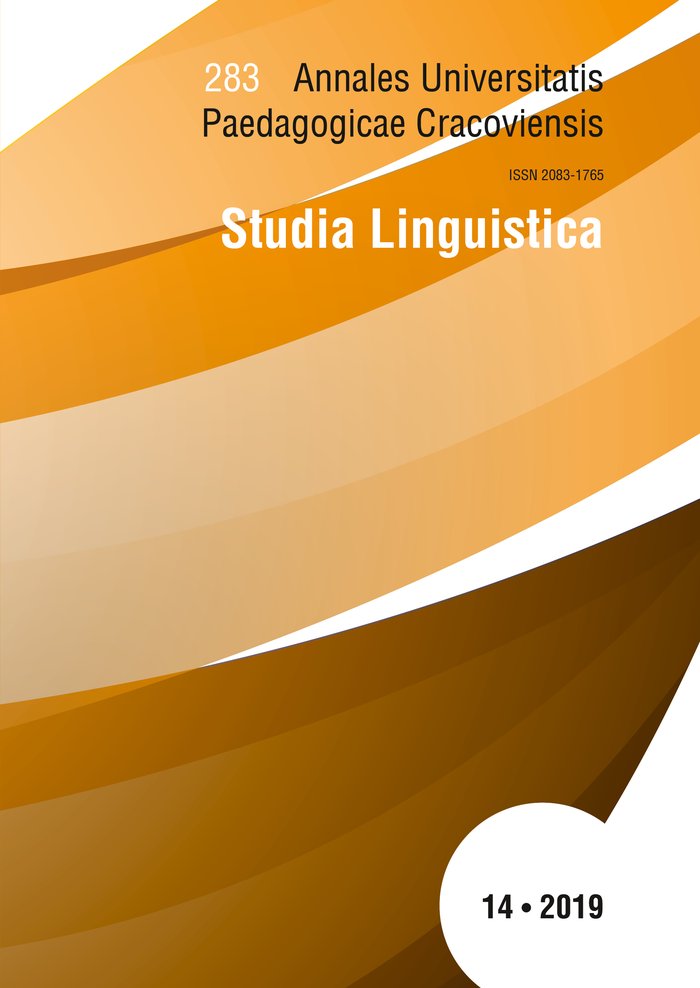Koldras Lacki on Turbacz
Main Article Content
Abstract
Professor Józefa Kobylińska, who was investigating her local dialect and Władysław Orkan’s language, paid attention to the writing on one of the rocks on Turbacz - Koldras Lacki, mentioned in W roztokach (1903), and associated it with the surname Koldras, found in southern Małopolska. It might have been used to denote a Roma from Kelderasz tribe, the people who made a living out of coppersmithing (from Romanian căldare ‘a boiler’), while the word ‘Polish’ Lacki might have been given by Russian-speaking Wallachian shepherds in Gorce. According to Kobylińska, the name Turbacz originated from the Russian *Turbacz with an ablaut, like in gorczanski dialect murczeć / mruczeć, frunąć / furnąć.
Downloads
Article Details
Author, submitting a text to the editorial board of the journal “Annales Universitatis Paedagogicae Cracoviensis. Studia Linguistica", certifies that the content of the article has not been published so far and that the work does not violate in any way the copyright or related rights of other person, as well as other rights of third parties, and that no one's rights to the work (or any part thereof) have been missed. After signing the contract, the property rights to the published materials are transferred to the University of the National Education Commission, Krakow.
“Annales Universitatis Paedagogicae Cracoviensis. Studia Linguistica” is an open access journal, and all its content is made available free of charge to users and institutions under the Creative Commons CC-BY-NC-ND 4.0 license (attribution, non-commercial use, no derivative works). Under this license, the authors agree that their work may be lawfully reused for any purpose, except for commercial purposes, without the prior consent of the author or publisher. Everyone can read, download, copy, print, distribute and process these works, provided that the author's marking and the original publication place are correct. Published texts may not be used to create derivative works (e.g. to translate and publish in another language without the consent of the publisher). This is in line with the BOAI (Budapest Open Access Initiative) definition. "Studia Linguistica" does not charge for submitting or processing articles.
References
Bubak J., 1992, Słownik nazw osobowych i elementów identyfikacyjnych Sądecczyzny, I–II, Kraków.
Google Scholar
Flizak S., 1938, W związku z napisem na Czole Turbacza, „Wierchy”, t. XVI, s. 217.
Google Scholar
Flizak S., 1958, Jeszcze o Kołdrasie, „Wierchy”, t. XXVII, s. 285.
Google Scholar
Kobylińska J., 1968, Rozwój form dopełniacza l.p. rzeczowników rodzaju męskiego w języku polskim, Wrocław.
Google Scholar
Kobylińska J., 1973, Z historii i geografii wyrazu frymark, „Prace Językoznawcze WSP”, t. II, s. 75–83.
Google Scholar
Kobylińska J., 1975, Realizacja nagłosowych grup Trut-, Tryt- w gwarach polskich, „Biuletyn Polskiego Towarzystwa Językoznawczego”, t. XXXIII, s. 95–98.
Google Scholar
Kobylińska J., 1990, Gwara w utworach Władysława Orkana, Kraków.
Google Scholar
Kobylińska J., 1997, Bronisława Stefania Szczepaniec (1903–1996), „Rocznik Sądecki”, t. XXV, s. 288–290.
Google Scholar
Kobylińska J., 1997, Świat językowy Władysława Orkana. Słowa i stereotypy, Kraków.
Google Scholar
Kobylińska J., 2001, Słownik gwary gorczańskiej (zagórzańskiej), Kraków.
Google Scholar
Kobylińska J., 2013, Studia nad językiem Ksiąg gromadzkich wsi Kasina Wielka (1413–1804), Kraków.
Google Scholar
Rymut K., 1991, Nazwiska Polaków. Słownik historyczno-etymologiczny, t. I–II, Wrocław.
Google Scholar
Rymut K. (red.), 1992−1994, Słownik nazwisk współcześnie w Polsce używanych (na podstawie materiałów Rządowego Centrum Informacji PESEL), t. I–X, Kraków.
Google Scholar
